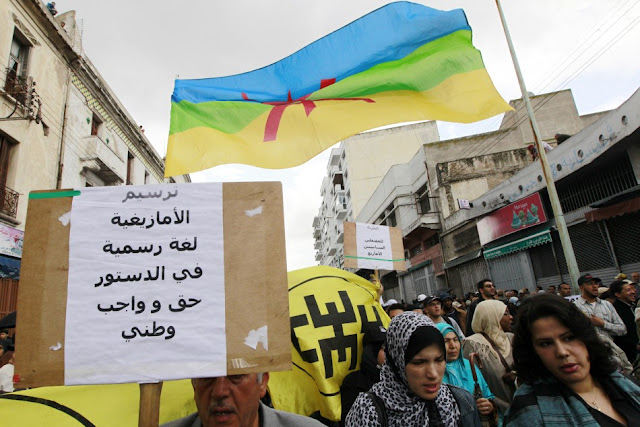But Moroccan Berbers that are 30% of the total population have been on the streets all along, protesting in what they are calling a new Printemps Amazigh or Berber Spring, not to be confused with its Arab counterpart.
Moroccans voted on constitutional reforms today at some 40,000 polling stations across the nation. There is little doubt that the vote will come out in favor of Moroccan King Mohamed VI's gestures toward change.
Among the reforms, the constitutional review will raise the Berber language or Tamzight to official language status, meaning that it will now be taught in Moroccan schools in addition to Modern Standard Arabic.
But the nation's Berbers say the gesture won't help their political marginalization by what they believe is an Arab-dominated government.
"This is a symbolic measure. But there are still those in government who have long worked against the integration of Amazighs (the Berber word for Berber) politically and these measures won't do much about them," said Ahmed Adghirni, the front man for the Berber struggle in Morocco, in a phone interview from Rabat, Morocco's capital.
Adghirni started the Parti Démocratique Amazigh Marocain (PDAM), a political party to represent Moroccan Berbers in 2005, although his gestures to represent Berbers politically started in 1993.
The party was banned in 2007 and formally dissolved by Morocco
"The activists in my party are trying to safeguard our rights. We are deprived of participation in Moroccan politics. We are looking for a favorable political climate to continue with our activities," said Adghirni.
Although they are largely unimpressed by the constitutional changes, Berber activists expect some improvement in their integration into mainstream Moroccan society.
"There are some Berber people in the Atlas mountains that come to live in the cities, but they can't make it in Moroccan cities, because they can't speak [Arabic]. Now the Arabs in Morocco need to learn Berber as they do Arabic," said Slimane, a 23-year-old Berber activist and documentarian in Marrakech, who declined to publish his full name out of fear of retribution from the anti-Berber Arab Islamists who have threatened Ahmed Adghirni's life on several occasions.
Both Slimane and Adghirni are practicing Muslims.
Despite the indisputable benefits, Slimane says that an official Berber language won't change popular Moroccan Arab attitudes towards Berbers.
"The Berbers are the ice cream in society -- not taken seriously, but a kind of novelty," he said, explaining that while Berber culture is sold to international tourists in jewelry and couscous platters, Morocco
Berbers consider themselves the indigenous people of North Africa and predate the Arab conquest of North Africa . Berber populations stretch from Morocco to Egypt and as far into Sub-Saharan Africa as Nigeria
Official Moroccan figures say Berbers make up 40 percent of the nation's population, but analysts say the number ranges from 60 to 70 percent. Berber activists say that Moroccan government statistics attempt to downplay the number of Berbers in the country to maintain an Arab majority.
Unlike Slimane, some Berber activists are outraged by the gesture to quiet Berber activists with what they call a token change in the Moroccan constitution.
"This is a trick to calm Berber organizations," said Hassan from East Morocco . Although the Berber's movement for integration and respect in Moroccan society has long outrun the recent Arab spring, the Jasmine Revolutions in Tunisia and Egypt provoked a series of protests this year, calling for democracy, and more specifically, political representation of Morocco
Hassan said that Berber activists are not convinced by the king's gesture toward change.
"Morocco
"This is only the beginning of the Berber fight. There won't be any respect for us unless we are represented in government."
Berber militants like Hassan are calling for self-rule.
"There won't be any more legitimacy [in the current government] unless it's run under a Berber system."
But Adghirni, the Berber political representative, has been weathered by death threats from pan-Arabist Islamist organizations.
"Sometimes I think about leaving Morocco
"But I have a duty to my people -- The Berber activists and everyday people. I'm obliged to stand by them."
